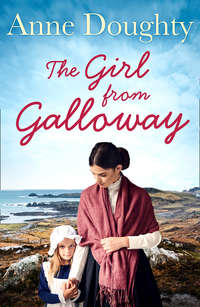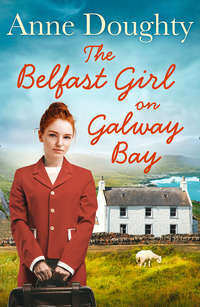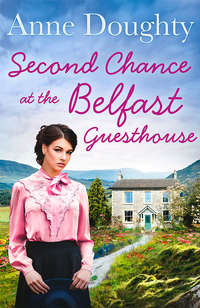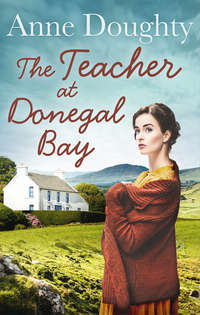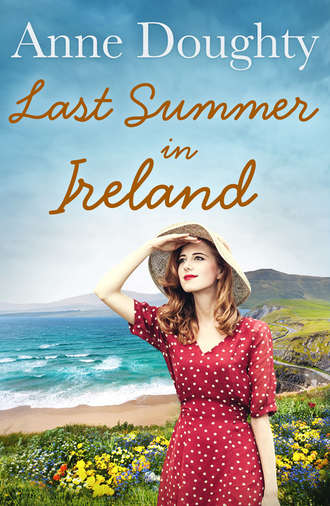
Полная версия
Last Summer in Ireland
‘Sire, I beg of you, for the vengeance of the Lady Merdaine and the safety of your people, do now what should have been done at birth.’ Conor paused, his face livid with colour, a light in his eye that Deara had seen only in animals crazed with pain, in labour or mortally wounded. She felt sweat trickle between her shoulder blades. Yet somehow, now it had come, she breathed easier, as if there were some comfort in seeing the danger and facing it rather than anxiously wondering from whence and in what manner the threat would come.
‘You would kill her, Druid? And what manner would you favour?’
The King turned his eyes from Deara and began to outline both torture and modes of death. As he spoke, so his large frame seemed to grow more ominous, his dark voice becoming yet more threatening.
‘Come, Druid, what manner would you favour?’
‘’Tis of no matter, Lord, but that it were done quickly.’
‘This evening, perhaps? Or shall you despatch her now? Fergus, your weapon, my friend.’
The King reached behind him and a warrior drew his sword and put it in his outstretched hand.
‘Here, Druid, here is a sword.’
‘This evening would do very well.’
Conor spoke hastily, his words muffled like a man who is parched. The light in his eye dimmed and he seemed to draw back from both the powerful questioning presence of the King and the proffered sword.
‘This evening will do as well as any. Is that so, Druid?’
The King balanced the sword in his hand, narrowing his eyes as if he were testing its trueness. For a moment he looked at the inlay of the handgrip, examining the delicate workmanship in the beasts entwined there. When he spoke again, he spoke softly.
‘And where would you suggest you kill this woman?’
Deara did not hear Conor’s reply. She was watching the King’s face, her body taut with tension. In the silence, she became aware of men moving like shadows along the walls. She waited for Conor to speak, to name the place of her execution. But Conor paused again.
Suddenly, it was the King’s voice that thundered out. Warm and welcoming, free of the dark menace which had chilled her heart as he consulted the Druid about her death, it roared down the Hall.
‘Welcome back, my brave warriors. Come, draw closer. I forgive you for leaving me thus to the business of Council. You would not have left me had I a sword in my hand and an enemy at my back. I know that well. Come, come closer and let you judge this case.’
The King rose to his feet and pointed the sword at Deara, as the men drew closer.
‘Here is this girl, a slave, the handmaiden of the Lady Merdaine. She is accused by Conor, chief of the Druids in the Ullaid, of witchcraft, of causing the death of that Lady. He wishes her death, for all your sakes, to keep you safe from evil.’
The King paused. Deara felt at that moment, that if she took her eyes away from his face, he would toss her aside like a bone to his hound.
‘Do not let him frighten you.’
As if the words had been spoken by someone present, Deara felt the memory touch her. She held her gaze and it was the King’s eyes that moved away.
‘What think you, my warriors?’
There was not a murmur from the warriors. They knew their King too well to answer a question that was purely rhetorical.
He raised the sword and looked at her again. Then he spoke once more, addressing himself to her in a strangely quiet manner.
‘A rare thing is it not, handmaiden, for a Druid, a Druid of such mighty power and knowledge of magic, to require your death so unceremoniously? Think you not it more seemly for him to make sacrifice to the Gods, to ascertain the most auspicious time for your despatch, the most auspicious place, and the most pleasing method? Surely there are proper observances for the purification of the evil caused by one such as you – a witch?’
The warriors murmured. Even the slower-witted amongst them had seen the drift of the King’s words. They had no love for Conor and his self-important ways, but, even if they had, it would be enough that the King’s favour had turned against him.
‘What say you, witch? Shall your King become your Druid? Shall I consult the magic lore and tell you what I see?’
The warriors roared their approval, and Morrough, smiling broadly, held out his hands to them.
‘I see a fat man, and a long road,’ he whispered loudly. ‘And I see hounds baying and footsteps fleeing – and – I do believe – ah, the mists, the mists dim my vision, I cannot see as I should. My powers are dimmed by a slavegirl – oh, what mischief is this . . . I am asleep again by her spells.’
There was laughter now, and the slapping of hands on thighs. Conor’s face, Deara could not see, but within her grew a seed of hope. If only she kept her eyes on the King she might yet live.
The laughter died away as the King made a dramatic gesture with his raised arms. He closed his eyes.
‘Ah, but hold, all is revealed to me. Why, it is Conor. Conor, the fat man, who boasts of the past and listens at doorcurtains, who feasts on the sacrifices the poor bring him out of fear. What say you, men, to my prediction? Shall I not be your Druid?’
‘Surely, surely. Morrough, our Druid and our King.’
The Hall filled with noise, the bang of weapons on wooden benches and walls, the hammer of fist on collar and belt, the stamp of feet, the chanting shout: ‘Morrough, Morrough.’
From the corner of her eye Deara glimpsed Conor’s hasty movement as he ran from the chamber. The men, still laughing, drifted away.
Morrough filled his drinking horn and lowered it, his head thrown back, his eyes closed. He wiped his mouth with his hairy arm and threw himself back in his chair.
‘So, brehon, what pledge did I give the Lady Merdaine? I have forgot.’
‘Sire, I have the deed here and your mark upon it.’
‘Get on then, man, would you have us here till Connaught wished us well?’
‘Item, that the Lady Merdaine doth give all her property to the King for his sole use upon one condition.’
‘Condition? I agreed to no condition. You are mistaken, man. You cannot make out your own marks.’
‘Sire, it is not writ in my marks; the script is in the lady’s hand.’
‘Then how can you read it? Her hand she conned from a trader in my father’s time. A rogue he kept about the place to play fidchell with.’
The brehon, who had throughout the day tolerated the King’s irritability, seemed at last to lose patience.
‘My Lord, the times are changing and we must change with them. It would not do if all of the King’s servants dozed by the fire and lined their pockets. In these three winters, Lord, I too have conned this language that can be written down more easily than our own. By your leave, I read you the words you spoke to the Lady Merdaine:
‘By the brooch of my mother brought in token, I swear that I will free the girl, Deara, give her dowry of twenty milk cows that she may be betrothed, or, if it be her wish, dowry in gold that she may pursue her studies with Alcelcius of Ard Macha into whose household she may enter.’
‘Twenty milk cows!’
The King bellowed as if he had been stung by a wasp, his face dark with anger.
‘Where in the name of all the Gods, man, would I find the price of twenty milk cows to dower a slave-girl? Had I a daughter of my own I might be hard-pressed to do as well.’
‘Sire, may I remind you of the kist the Lady Merdaine left to you. It was her wish that you would benefit by her gift.’
The beam of sunlight that had filled the chamber all day finally moved westwards. Shadows sprang up in all the corners. Deara, still standing before the King, felt again the sense of desolation that had come to her as she tied back the hanging after Merdaine’s death. Then, she had faced the blinding light of day with no protection from its strength, now, what strength she had seemed to be draining away with the light, as the King and brehon argued.
‘Well, then, open it. If you have no key, let Fergus fetch Ulrann and his hammer from the forge.’
The brehon, however, had already produced the key. Like everything he had done, all day, he proceeded meticulously. Watching him, Deara realised that his manner was both a defence against the King’s turbulence and a compliment to it. These two men, opposite as they seemed, were in some way bound to each other. It was not a bond of love, such as she saw amongst the young warriors. It was a bond of need, a defence against a loneliness which neither colleagues, nor warriors, wifes or concubine, could take away. In the midst of her own need, intensely aware of her own unprotected isolation, suddenly she saw a need just as great in two men who, it seemed, had everything that she lacked. They, who had position and power, who could dispose of her life by a word to a warrior, or a mark on a tablet, were in a way she could only dimly grasp, as weak, as vulnerable, as unsure of their place in the world, as she herself was.
‘By all the Gods.’
The King turned to Deara from the open kist behind which the brehon still knelt.
‘What do you know of this, girl?’
‘Of what, my Lord?’
By way of answer, the King leaned down and showered at her feet a handful of coins and a cluster of armbands, beaten in gold and inlaid with bronze. In the dim light they gleamed like pale flowers at dusk.
The thin hands of the brehon set down on his table a silver drinking cup, a set of gold torcs, a terracotta figurine and a jewelled belt.
Deara looked from one to the other.
‘Well, then, what do you say?’
‘My Lord, it is the custom to bring an offering to the God when one comes to ask for his healing.’
‘And do my people bring such gifts as these that I, their King, have not the least of them?’
‘No, my Lord, the people of Emain bring food and drink, and neighbouring peoples bring cloth or skins. Only the traders bring such gifts as these.’
‘Traders? The Lady Merdaine traded? With what?’
‘Wound salves, sire.’
‘To salve the wounds of our enemies?’
‘No, my Lord. All that I could make went to Albi.’
‘You? You made them?’
‘Yes, my Lord, at the Lady’s bidding. They are very good wound salves, the same as we use ourselves.’
The King sat down suddenly, filled the silver drinking horn from a pitcher of beer and downed it in one long swallow. He wiped his face and began to laugh.
It was a real laugh, not the hard, uneasy laugh Deara had heard so often that day. She glanced at the brehon, but his face had not relaxed its habitual close scrutiny. He was examining the final items from the bottom of the box and marking their value on a tally.
‘Well, then?’
‘Between 200 and 300 milk cows, Sire. I must consult to be sure.’
‘So, Deara – that was your name, was it not?’
‘Yes, my Lord.’
‘So, you shall have your dowry. How say you to Marban, son of Dairmid, a brave young warrior? He lacks nothing but a wife to furnish him with new weapons, a good horse and a handful of sons.’
Deara’s heart sank. She knew little of the young warriors, for the Lady never spared her to serve with the other young women in the King’s Hall, so much was there to do in preparation for the coming of the traders. But Marban she knew of by repute, as did all in Emain. A small, swarthy man, boastful even beyond the custom of warriors, a man who took pleasure in cruelty to any weak creature, be it child or hound puppy. The thought of Marban made her tremble more than the threat of Conor.
The King was staring at her again, fiddling impatiently with the brooch she had brought as a token.
‘Come then, girl, your word, and let Sennach draw up the agreement.’
‘If it please my Lord, I would ask my dowry in gold, that I may enter the house of Alcelcius.’
‘Alcelcius? What manner of man is this, Sennach, with such a name. Is he a trader?’
‘No, my Lord, he is not of our people. He came here from Dalriada and was once a surgeon with the legions from Gaul.’
‘And you would go to be his concubine?’
‘No, my Lord, Alcelcius is an old man, who takes pleasure in books and writings. I would go to learn what the Lady Merdaine would not teach me.’
‘And what was that?’
‘To read and write, that I might set things down as she did.’
‘And make wound salves?’
‘If they are needed.’
The King swung away from her and thrust the sword by his chair into the earthen floor at its owner’s feet. The man started and the King laughed, short and hard.
‘Make your wound salves, Deara, aye and learn well to bind and splint – but pray to Lug that they will not be needed. D’ye hear, girl?’
Deara dropped her eyes from the King’s face in acknowledgement of his command. She saw the glint of jewels at her feet. When she looked up again her fear disappeared, for in the King’s eyes she saw a fear far greater than her own. Not for himself, but for his people, for all that was entrusted to him.
Morrough, the strong and mighty Morrough, King of Emain, ruler of all the Ullaid, sat in his carved chair, fondling the muzzle of his hound bitch and looking at her. What she had seen in his eyes was something she knew with her heart. This man stood alone. Alone in spirit and every bit as unprotected as she had known herself to be. She felt herself shiver and knew the flesh had roughened on her bare arms, though the Hall was thick with heat.
‘D’ye hear me, girl?’ he repeated more insistently. ‘Pray to Lug. Wear this for the Lady Merdaine.’
Morrough pushed the brooch into her hand, roused a sleeping hound with his toe and left the chamber without a backward glance, followed by the dogs, the chief of the guard and a small group of warriors on duty by the door.
Deara stood staring at the precious object in her hands, unable to grasp what had happened to her.
She had entered the Hall of Council, a slave, a fearful slave, knowing that her life might be forfeited without the protection of Merdaine. And now in her hands, she held the Royal brooch of Emain. Worn by the Princesses of the Ullaid for as long as bard or Druid could remember, worn by the King’s mother, and mother’s mother and by his mother’s youngest sister, Merdaine. Now hers. This thing of power and beauty and protection. No man of the Ullaid would dare raise a hand against her. Even the enemies of the tribe would heed such a token, if only in hope of the ransom money such a captive might bring.
‘Deara.’
The sound of her name seemed to come from a long way away. She looked up, her eyes still held in the swirling tracery of the brooch. The Hall of Council was empty, except for one pale face, Sennach, the brehon. He sat at his table looking at her.
‘You serve Nodons?’
She bowed her head in acknowledgement, for words seemed to have deserted her.
‘Your God has been kind.’
His statement was matter-of-fact. The voice he used was no different from the voice he had used all day, to question, to clarify, to record. But something in his eyes spoke louder, less dispassionately. It told her what she was already coming to recognise, that something had come to help her in her deepest need. She had no idea what it was, but it had come, just as Merdaine had promised. Some would call it a miracle.
She looked at the brehon steadily and saw the weariness which dragged at his body. It looked as if his life was draining away. She who had been given back life, could not bear what she saw.
‘Sir, I thank you for your kindness to me . . .’
She paused and grasped more firmly the brooch in her right hand.
‘Sir, I would take an offering to the God and bring you back a draught from the well.’
The brehon laughed. The sound was short and brittle.
‘Would you heal me then of the cares of office? Will you give me back sleep and pleasure in food? Have you a wound salve for the heart, then?’
‘The God has all these things.’
‘And he will give them to you, if the offering is large enough?’
‘No, sir. The God gives, the God takes away. It is His wisdom, not the offering, but we who serve are permitted to ask, for those who will give us leave.’
The brehon glanced round the empty hall as if he were making an inventory of the blackened rafters, the wooden benches and the empty drinking horns.
‘And if I say yes, what offering will you take?’
‘I do not know, Sir. When I have held your need in my heart, the God may tell me what he wishes, and then I will go to the well.’
‘And bring back healing in a pitcher?’
‘If the God wishes.’
The brehon repeated the words thoughtfully and considered them, as he considered everything. On the face of it, it was quite obvious. The girl believed a traditional set of superstitions known to the tribe for centuries. Most women did. Quite unfounded in the face of any real danger, but no doubt useful for day-to-day ailments. One had to admit some of these things worked. Some didn’t. One could see that quite clearly. The girl herself was a different matter. Not clear at all. There was something unusual about her. She was almost enough to make one imagine the unimaginable.
‘If I say yes, when will you go?’
‘Tomorrow, Sir, as soon after the noon hour as I can finish my tasks.’
‘Very well, then. Come to me at this hour and we shall see if your pitcher brings back my appetite. Go now and eat. May your food bring you strength.’
‘Thank you, Sir. May your sleep bring you peace.’
Deara smiled at the brehon and bowed her head as she returned the evening greeting. Then she walked from the Hall of Council into the swirling woodsmoke of the cooking fires and the red flame of the sunset, carrying in her left hand the Royal brooch of Emain.
7
When I saw Deara walk from the Hall of Council, a free woman under the protection of the King himself, after all the anxiety she had suffered throughout that long day, I was so relieved and so excited I wanted to stand up and cheer. I wanted to run after her and throw my arms round her and challenge anyone who might have slighted her, and tell them to their face, ‘There, I told you so’.
What actually happened was very different. I opened my eyes only to find myself under the hawthorns, exactly where I’d sat myself down when the awful agitation came upon me and I’d started making a mess of everything I tried to do.
Plainly, I couldn’t chase after Deara, so I made no move at all, just went on sitting in the dappled shade, looking out over the lawn and enjoying the splashes and patches of colour in the flourishing borders. But I was so grateful something had come to help Deara in her need. At the same time, I couldn’t help being totally absorbed and enthralled by the remote world in which she lived. I found I was running through the whole of her time in the Hall of Council once again, minute by minute, detail by detail.
I was intrigued by the unwritten law Morrough administered in such an extraordinary fashion and the customs and practices of the people over whom he ruled. I was appalled by Conor the Druid, curious about this person, Alcelcius, whose home was soon to be Deara’s, and absolutely intrigued by Sennach the brehon with his tally system for reckoning wealth and his new language he had taught himself over the last three winters.
There was so much more I wanted to know, so many questions I was dying to ask. How I wished I’d been able to see those documents on his table, particularly the one in Merdaine’s hand. I love old documents of any kind. Regardless of their content, I feel they bring you so close to the person who wrote them. I’ve often imagined how exciting it would be to touch something really old and precious, the kind of thing now kept behind security glass with alarm systems like the Lindisfarne Gospels, or the Book of Kells, or the one I should like to handle most of all, the Book of Armagh itself.
Sennach was such a precise character, meticulous and methodical. His long, pale face reminded me of a man who used to work with Daddy in the shop. Poor man, he never looked well, but he was still alive, able to dig his garden despite his eight decades while Daddy was long gone.
I sat on and on, with so much going through my head I couldn’t begin to sort it all out. Suddenly, everything cleared and words took shape just as if someone had spoken them out loud. It was the advice Merdaine had given to Deara just before she died. ‘If you do as your heart speaks, then in your sorest need, help will come. But you must trust that it will come.’
I repeated the words aloud to myself. They made perfect sense, however many centuries might have passed since Merdaine herself had spoken them. Help would come for Deara, but only if she believed that it would. And if it would come for Deara, then it would come for me were I to believe that it would. The more I thought about it, the more it seemed to me Merdaine’s advice applied as much to me as to Deara. I had to confess to myself that I’d lost my hopefulness over the years, my confidence that things really would or could come out right for me. Oh yes, I’d achieved many things. I was successful after the fashion of my own world. I had a decent job and earned a reasonable income. But so much potential happiness was marred by my doubts and anxiety.
Suddenly and very sharply, I saw that Merdaine’s words were telling me it would be better for me to cherish hope, to develop new confidence and take a chance on failure, than to go on in my normal, cautious and considered way.
As the shadows lengthened across the lawn, reluctantly I went back into the house. As I came through the kitchen into the hall I stopped in my tracks and stared at a striking, arched arrangement of pear blossom and dark petalled tulips, set against the well-polished mirror above the hall table, as if I’d never laid eyes on it before. I laughed at myself.
For days now, all I could think of was getting through the cleaning jobs in the house so I’d be free to go out into the garden. And without being quite aware of what I was up to, I’d brought the garden back in with me. All the rooms were fresh and full of light. With the windows open, the smell of blossom and flowers outdoors mingled with the perfume from the branches and posies I’d arranged and placed in every possible corner.
‘No wonder the estate agent was so complimentary,’ I said aloud, as I passed down the hall. I pushed wide the sitting room door. Gone was the electric fire Mother had parked in the hearth, the clutter of small tables that fell over at the slightest provocation, the assorted ashtrays and piles of product catalogues that were her constant companions. Out in the garage I’d found the wrought iron companion set from the hearth and the old willow basket that once served the open fire. Filled with turf and logs from a dusty corner of the garden shed, it now stood ready for a wet afternoon or a chilly evening. To my amazement, I realised I was actually looking forward to sitting here, by a fire, in the lamplight.
Then I walked through the whole house and I wondered how I could ever have seen it as dark and dreary. I was amazed the effect a few well-placed objects retrieved from cupboards and drawers had had. I’d found them, stacked away like the fire irons and the log basket, things I’d once known and loved. Old-fashioned. Dustcatchers. Those were the words to describe any object that didn’t meet with Mother’s approval. Well, I’d certainly shifted plenty of dust, but as I stood looking over the banisters down into the heart of the house, it seemed to me that the light, warm summer breeze had swept something much more pervasive than dust out of Anacarrig, once and for all.
In the few dark hours of the short May night, Deara lay awake yet again. Despite the help the day had brought and the reassuring shape of Merdaine’s brooch in a pouch beneath her pillow, she felt uneasy. The hut seemed strange and empty, bereft of Merdaine’s spirit, untenanted, as if cold ash lay unswept in the hearth, food bowls stood unscoured and the strewn rushes browned with age as she had seen them often enough in homes abandoned after plague.


